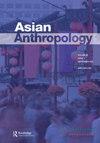Asian food and culinary politics: food governance, constructed heritage and contested boundaries
Q2 Social Sciences
引用次数: 4
Abstract
Abstract This introduction outlines the conceptual framework of the special issue. Culinary politics involves a contest over the social organization and cultural meanings of food by a variety of actors: both civil and state, the powerful and the grassroots. In particular, we consider food governance as a form of culinary politics entailing a two-way traffic, in which policies and regulations are set by state actors, while the responses of civil actors often reshape the foodscape and complicate the outcome of food policies. Food governance also points to the reshaping and contestation of collective and individual food identities, and how different power hierarchies can be challenged through acts of food-making. While food is an enduring cultural concern in human life, food governance and culinary politics should be two important concepts for researchers to engage with when examining individuals' soft skills of food-making and the exercise of soft power through food.亚洲食品与烹饪政治:食品治理、建筑遗产和有争议的边界
本导言概述了特刊的概念框架。烹饪政治涉及到一场关于社会组织和食物文化意义的竞赛,参与者包括公民和国家、有权有势的人和草根。特别是,我们认为食品治理是一种涉及双向交通的烹饪政治形式,其中政策和法规由国家行为者制定,而民间行为者的反应往往重塑食品环境并使食品政策的结果复杂化。食品治理还指出了集体和个人食品身份的重塑和争论,以及如何通过食品制造行为挑战不同的权力等级。虽然食物在人类生活中是一个持久的文化问题,但在研究个人的食物制作软技能和通过食物行使软实力时,食物治理和烹饪政治应该是研究人员参与的两个重要概念。
本文章由计算机程序翻译,如有差异,请以英文原文为准。
求助全文
约1分钟内获得全文
求助全文
来源期刊

Asian anthropology
Social Sciences-Anthropology
CiteScore
1.60
自引率
0.00%
发文量
25
期刊介绍:
Asian Anthropology seeks to bring interesting and exciting new anthropological research on Asia to a global audience. Until recently, anthropologists writing on a range of Asian topics in English but seeking a global audience have had to depend largely on Western-based journals to publish their works. Given the increasing number of indigenous anthropologists and anthropologists based in Asia, as well as the increasing interest in Asia among anthropologists everywhere, it is important to have an anthropology journal that is refereed on a global basis but that is editorially Asian-based. Asian Anthropology is editorially based in Hong Kong, Taiwan, and Japan, but welcomes contributions from anthropologists and anthropology-related scholars throughout the world with an interest in Asia, especially East Asia as well as Southeast and South Asia. While the language of the journal is English, we also seek original works translated into English, which will facilitate greater participation and scholarly exchange. The journal will provide a forum for anthropologists working on Asia, in the broadest sense of the term "Asia". We seek your general support through submissions, subscriptions, and comments.
 求助内容:
求助内容: 应助结果提醒方式:
应助结果提醒方式:


